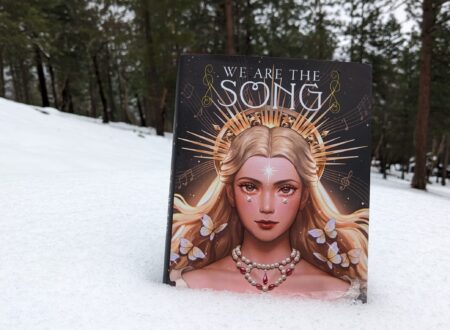 We Are the Song
We Are the Song
by Catherine Bakewell
The (a) story follows Elissa, a young girl whose voice has been divinely blessed by the Mother Goddess. She is part of a group of twelve musical devotees who can sing miracles into being, and who have been tasked with traveling across kingdoms torn by war, spreading love and healing to those who need it.
But when Elissa’s voice is inadvertently used to destroy instead of heal, it becomes apparent that her power can far too easily be abused by those with dark intents. Suddenly alone in an unfamiliar land, Elissa’s faith in her goddess, in her companions, and in herself is tested. But in the end, what will ultimately save her and the people she has devoted her life and her voice to, is her belief.
The (A) story is about power, and the responsibility that comes with it. We see this in a literal sense through Elissa’s magic, which is used to clear roads, heal the sick and wounded, and even transform one thing to another. But it is also seen through the various authority figures she comes across in her travels, and the ways they disregard the bigger picture and the possible consequences that may arise from using her power in ways it wasn’t meant for. We also get an ugly demonstration of the helplessness that comes with having our power, with having our voice, taken away by those who disagree with how we choose to use it. In the end, it should not be for others to decide how we use the gifts we have been given.
In a similar vein, We Are the Song is also very much about faith. Specifically, it demonstrates the differences between faith of doctrine and faith of the heart. Throughout the book, Elissa maintains a deep and close personal connection with her Goddess, even in the midst of her doubts. And while others have their own ideas as to what the Mother Goddess wants from her, Elissa seems to be the only one who really stops to feel and listen. She frequently questions what she is being told to believe by others and chooses instead to do what feels right in her heart and her soul, in spite of being shamed for it. And, ultimately, it is her faith that prevails.
This was a good, atmospheric story that took me across snow-swept mountainsides and through grandiose palaces. Though, while I enjoyed it, it didn’t necessarily “wow” me. The writing was good, and the characters were interesting, but I felt like the stakes were low for much of the book. I didn’t get a sense of urgency that made me need to turn the page and find out what happened next. And in line with this lack of urgency, the ending seemed anticlimactic. Also, the music references got to a point where they seemed on the verge of ridiculous. For instance: a fantasy realm with lakes and mountains named after famous composers from our reality just felt like overkill to me, personally.
By all means, feel free to read it and draw your own conclusions. But I have a feeling it is not a book I will be fondly returning to over and over again.





